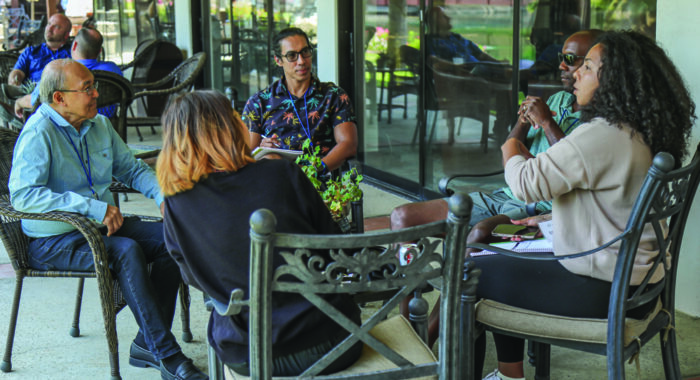With billions of dollars spent on presidential campaigns every four years, it is almost impossible for anyone who has a radio, television, computer or smart phone to ignore the barrage of news, advertisements and commentary on America’s favorite pastime: politics.
When Christians gather for worship on Sundays or for Bible study and fellowship during the week, the political messages they hear are likely to echo in their minds. How should pastors lead their flocks during this time?
One viable option is to say nothing at all about politics. The Church’s central task is to make disciples of Jesus Christ; discussing politics can expose divisions within the Body of Christ and distract from the core functions of worship, evangelism and discipleship. Most churches want to be safe places where Republicans, Democrats and Independents can gather without being ridiculed or ostracized for their political views.
Of course, not explicitly addressing politics does not necessarily cleanse the church of political bias. Sometimes the most powerful messages are subliminal. In her insightful book, “The Politics of Evangelical Identity,” Lydia Bean traces the subtle ways in which partisan cues sometimes function in churches that would never overtly endorse a political candidate or party.
At the same time, if Jesus is Lord over all then he will have something to say about how our nation is governed and how public justice is administered. Further, the Bible makes clear that all human authorities are accountable to God. In a democracy, voters are part of the process and will be accountable for how they steward the gift of their citizenship.
Pastors and church staff must be careful in their approach, yet prophetic in their calling. Before doing anything, pray for wisdom. Then, consider these guidelines.
Teach the Whole Counsel of God
Make sure that congregants engage over time with sermons and studies drawn from all parts of the Bible. The historical books contain valuable lessons on how God works through human leaders. The poetic books offer profound insights into human nature. The prophets lay out a bold vision for justice and righteousness in public life. The gospels present Jesus’ grand vision of the kingdom of God, with implications for every area of life. The epistles show us the people of God, propelled by the Holy Spirit, learning to deal with internal and external conflicts and carrying the gospel to the ends of the world amid opposition and persecution. The book of Revelation critiques the abuse of power and unmasks its satanic roots.
Promote a Thoughtful Policy Agenda
Building on biblical principles, guide members toward study and dialogue that applies their faith to the issues of the day. The NAE has developed a helpful resource, “For the Health of the Nation,” that lays out the biblical basis for engaging in public policy and articulates seven principles that can guide our civic engagement:
- Protect religious freedom and liberty of conscience;
- Nurture family life and protect children;
- Protect the sanctity of human life and safeguard its nature;
- Seek justice and compassion for the poor and vulnerable;
- Protect human rights;
- Seek peace and work to restrain violence; and
- Protect God’s creation.
Adopting these principles will not resolve every policy question, but it provides a balanced agenda that can keep us centered in our public engagement.
Encourage Congregants to be Wise Stewards of Their Citizenship
An important dimension of the mature discipleship to which followers of Jesus should aspire is responsible stewardship of the gift of our citizenship. Educating ourselves about the issues and candidates, and supporting those who will most effectively advance the common good, are ways in which we can love and bless our neighbors. This includes registering to vote, and voting intelligently, but it also includes much more than simply choosing among candidates for office.
By actively articulating a biblically informed vision for our nation, we can help shape the dialogue and debate about what direction the country should take and what values we should promote. Responsible citizenship also involves holding our leaders accountable for their promises and for their stewardship of their responsibilities. Good leaders appreciate constructive criticism from both supporters and from the loyal opposition, as they know that this pressure improves their leadership and effectiveness.
Regularly Pray for Our Leaders (All of Them)
Understanding the daunting challenges facing our leaders, we should welcome the biblical commands to pray for those in authority over us. We should do this as individual believers, but we should do this when we come together for corporate worship.
Praying for our leaders will sensitize us to the pressures and temptations they face. Praying over the issues facing the nation will open our eyes to the complexity of our problems, which are rooted both in our fallen nature and in our finitude.
By God’s grace and with the cooperation of the people, our leaders can do well, but they will inevitably fall short. We can be gracious even as we press for greater accountability. Prayer for our leaders will leaven our political discourse and enable us to show the way to a more civil public square.
This article originally appeared in Evangelicals magazine.
Galen Carey, NAE vice president of government relations, is responsible for representing the NAE before Congress, the White House and the courts. He works to advance the approach and principles of the NAE document, “For the Health of the Nation.” He is also co-author with Leith Anderson of “Faith in the Voting Booth.” Before joining the NAE staff, Carey was a longtime employee of World Relief, the relief and development arm of the NAE, serving in Croatia, Mozambique, Kenya, Indonesia and Burundi. He received an M.Div. from Trinity Evangelical Divinity School, and a Doctor of Ministry from McCormick Theological Seminary.




 View All Articles
View All Articles 





























